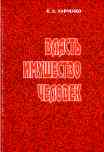
Kharchenko, Konstantin. Power-Property-Human: The Property Redistribution in bolshevik Russia
1917 - early 1921. - Russkiy Dvor, Moskow, 2000. - 264 p.

| Order! |
- Everyday Life in Revolutionary Russia...
Psychological atmosphere in Revolutionary Russia...
Konstantin Kharchenko
Psychological Atmosphere in Revolutionary Russia, 1917-1921. Treating with the ''Rough Fabric'' of Historical Records
This essay focuses on how the extraordinary circumstances begot cruel reactions, affecting both Soviet officials and common citizens in the first years of Bolshevik regime. The question under study is of interdisciplinary nature. In addition to the institutional, social and mental history, it touches upon some philosophical, psychological, linguistic issues. It also involves some data from psychiatry in some degree, as, in early twentieth century Russia, several research works devoted to the nature of revolutionary neurosis have appeared in psychiatric journals.
In this respect, if the approaches proposed by the 'Annals' were employed, the Russian revolution would be interpreted as a special type of mass psychics and mentality.
Ironically, just for some months the human wickedness unfolded while plundering lords' economies have unexpectedly reversed to the cruel overall confiscation of property from the population by the Bolshevik state.
Oddly enough, the psychological atmosphere might be examined through official records. Generally, the word 'atmosphere' stands for something "mental" that seems to be better revealed by diaries and memoirs, I suggest that decrees, circulars, resolutions, minutes, etc. are, however, not less valuable. The point is that semi-literal Soviet officials, disavowing verbally the bureaucratic past, rejected traditional official style. Therefore, their written language suffered from the intrusion of slang, colloquialisms, freakish metaphors, and vulgarisms.
This essay seek to reveal how the language usage, being the only way to keep the state running, promotes cruel policy of the upper rulers. The civil servants employed rhetorical devices while making direct and implied threats, however, the most awful thing was when brutal actions were neutrally mentioned in their routine.
The other type of the considered records, standing opposed to the documents produced by soviet officials is appeals of common citizens that illumine the coercion of the "hydraulic state" (speaking after Wittfogel) from below.
This abstract was submitted for consideration to be presented on the conference ''Evil and Human Wickedness'' that will be held in Prague, the Czech Republic (March 20-25, 2002).